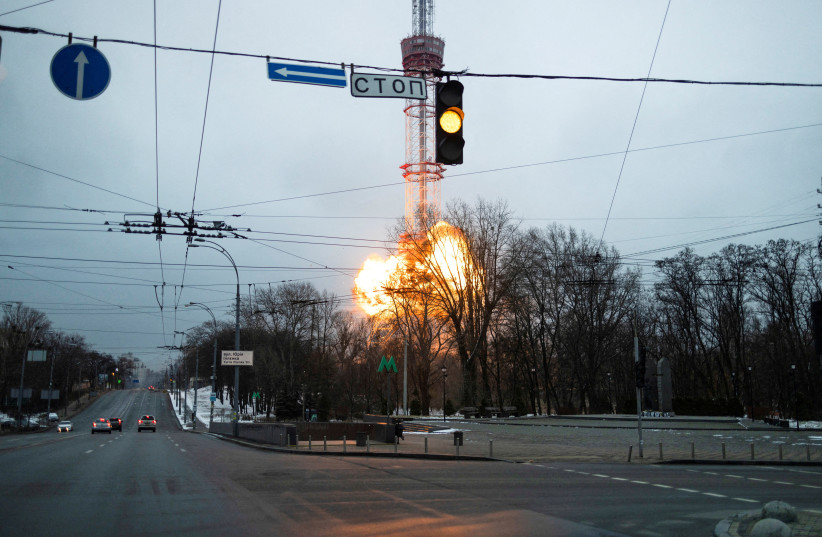The pictures of havoc, devastation and loss of innocent life emerging from Ukraine are heartbreaking. However, it is crucial to remember that live in an era of disinformation and social media manipulation, and when we declare untruths or retweet distortions of the facts, we run the risk of trivializing the real pain and suffering.
Here are the facts: Vladimir Putin did not drop a bomb on Babyn Yar. I repeat: Putin did not bomb Babyn Yar. At least not intentionally. If, in fact, any of the large memorial site was impacted, it appears to have been collateral damage resulting from a nearby strike on a telecommunications target.
Here’s why that matters.
The story of Putin’s complicated relationship with the Holocaust takes us back to January 2020. To mark the 75th anniversary of the liberation of Auschwitz, Dr. Moshe Kantor brought national leaders from across the globe to Yad Vashem for the World Holocaust Forum. My wife and I were invited to accompany Kantor to Jerusalem as his London-based rabbi and rebbetzin. It was a powerful and unforgettable experience to be part of the unprecedented event. Never in history had so many heads of state come together to condemn antisemitism and declare their united support for the Jewish people, but the event wasn’t without its glitches.
The most unfortunate moment took place when Vladimir Putin addressed the assembly. Shockingly, the Russian president utilized the occasion to push his country’s distorted WWII narrative, politicizing and putting a damper on the historic juncture. Upon our return home to the UK, we were planning to do a follow-up event for the British public, but it wasn’t straightforward. The media had jumped on Putin’s address, and we now faced local opposition who didn’t want to be involved in a contentious issue. I probably would have been able to navigate the matter and organize the important gathering. Sadly, however, it wasn’t meant to be, as shortly thereafter the COVID-19 pandemic struck.

I am no stranger to controversy surrounding Holocaust-memory. As former chair of the National Holocaust Monument of Canada, I took responsibility when we unveiled the opening plaque that recorded and remembered the loss of “All the victims of the Nazi genocide.” For the record, it goes without saying that we were all aghast when we noticed that the plaque failed to specify the six million murdered Jews, opting instead to generalize the massacre. Prime Minister Trudeau was unfairly and wrongly accused of Holocaust distortion, and so I chose to take the fall. Till this day, I have no idea who composed the wording on the plaque, and whether or not the heinous omission was intentional.
This brings us back to Babyn Yar. The overwhelming majority of people murdered at that terrible site were Jews. But when the Soviet Union built a Holocaust monument there in 1976, it was dedicated to all the Soviets killed by the Nazis. Instead of being about the genocide of 100,000 Jews, the Soviets made it about themselves. Jews didn’t count. Only after the fall of communism did the new government erect an additional monument on the site dedicated specifically to the Jews.
That’s how I know that Putin wasn’t aiming for the Babyn Yar Holocaust memorial when he bombed the TV tower. It would not have served Putin’s interests to strike Babyn Yar. The site was established to serve the narrative of Russian victimhood, which is precisely the narrative he’s pushing right now as his brutal forces make their way across the Ukraine, destroying everything and everybody in their vicious path.
Nevertheless, in an attempt to tug at the heartstrings of Jews and others around the world, Ukraine’s President Zelensky escalated the issue and made the attack all about the Holocaust. A strike on a TV tower triggered the cry of “Never Again.” That’s the kind of thing that Yad Vashem director Dani Dayan calls Holocaust trivialization.
Here’s what we must remember constantly. We don’t do that kind of thing. Vladimir Putin hijacks agendas like the World Holocaust Forum and engages in Holocaust distortion and trivialization. We don’t. We’re the good guys. The moment we start blurring the lines between a TV tower and a monument a few hundred feet away, we compromise our moral and ethical advantage and distinction.
We have a responsibility to ensure that Babyn Yar is not another ghost of Kyiv. We don’t need to engage in the promulgation of disinformation to win this war. Because we’re the good guys. That’s why the West will win the war over tyranny. May that happen speedily.
The writer, a rabbi, received his PhD in International Relations from the University of Alberta and served as the inaugural chair of the National Holocaust Monument of Canada. He is the author of the popular Transformative Daf book series, available on Amazon and local Jewish bookshops.
